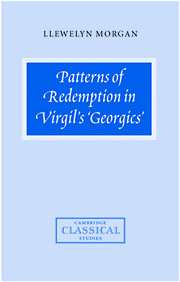Appendix III - Sparsere per agros
Published online by Cambridge University Press: 05 July 2015
Summary
Evidence to suggest that an agrarian interpretation of the death of Orpheus during Dionysiac rites – we might call it the Frazerian view – would have been a natural one for Virgil's ancient readership is diffuse but nonetheless, I think, ultimately cogent. One of Frazer's own examples is striking: in Apollodorus' account of the death of Lycurgus at Dionysus' instigation Lycurgus, having unwisely expelled Dionysus from the kingdom of the Edonians, is dismembered by horses. The effect of this dismemberment is to restore fertility to the land (Apollod. Bibl. 3.5.I). There is evidence that the myths of Dionysus' descent to and ascent from the Underworld were interpreted similarly. Pindar, in particular, strongly associates the figure of Semele and the joys of spring, presumably in the context of her anodos with Dionysus. Certainly given the extensive syncretism between Dionysiac cult and other mystery cults – the Eleusinian and Isiac – with strong agrarian associations6 such an interpretation would have come fairly easily; and indeed a number of references in Diodorus (and elsewhere) significantly associate the Dionysus of the mysteries, Osiris-like, with the innovation of agriculture.
The rituals of the city of Rome itself may have provided their own impetus in this syncretistic direction. Initially Liber, ‘an old Italian god of fertility and especially (though perhaps not originally) of the vine’, became identified with Dionysus. He and his female counterpart Libera had a festival, the Liberalia, on 17 March. However this festival seems to have been a rather low-key and rustic affair. Liber ‘is not known to have had a temple in Rome in Republican times’. The Liberalia was eclipsed by the worship of Liber in combination with Ceres and Libera at the Cerealia of 19 April. Ovid tells us that in his day, although there had been games in honour of Liber on 17 March, he now shared games with Ceres on 19 April (Fast. 3.785–6; cf. Cic. Verr. 2.5.36).
- Type
- Chapter
- Information
- Patterns of Redemption in Virgil's Georgics , pp. 230 - 235Publisher: Cambridge University PressPrint publication year: 1999



